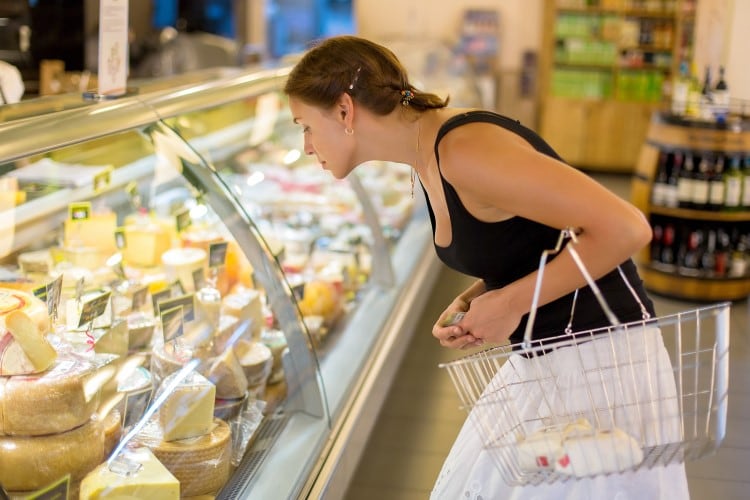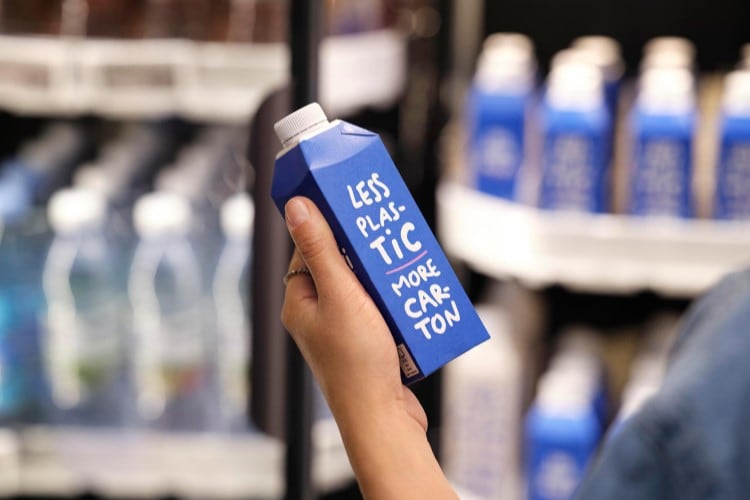Manufacturers are increasingly looking to add value to their dairy products in a bid to differentiate in a highly-competitive market. While dairy is traditionally rich in a probiotics, new food technological advances have enabled products such as UHT milk and other non-refrigerated dairy products to be fortified with probiotics and vitamins without the need for refrigeration. The breakthrough was facilitated through a partnership between packaging manufacturer SIG and micro encapsulation specialist AnaBio Technologies, and according to AnaBio CEO Dr. Aidan Fitzsimons, there’s a huge market opportunity right there.
“Probiotic beverages are almost always refrigerated, of short shelf-life and of limited appeal to the on-the-go, convenience lifestyle consumer,” he told us. “You can’t throw one in your car, leave it there, and drink it later.”
He added that his company has estimated that the market for probiotic beverages can reach a valuation of €50bn/$53.9bn in three to five years, making the next few years crucial for new product development. “If we could release these beverages from the fridge, the untapped market potential is huge,” he added. “By taking away the refrigeration, you are reducing cost, making distribution much easier and much more sustainable.”
Alongside packaging manufacturer SIG, AnaBio launched the first prototype of an ambient, probiotic-fortified yogurt drink in September. While beverages are the most obvious type of application for the technology, ambient yogurts – a trend that arrived from China in recent years – has been gaining popularity with on-the-go-consumes; the category is another candidate for fortification with probiotics and bioactives that can add value and appeal to the health-conscious consumer.
Over in the US, back in March 2023, dairy co-operative Dairy Farmers of America launched the first ever probiotics-fortified UHT milk – more on this here.
Stretchier, tastier cheese alternatives
In the realm of dairy alternatives, manufacturers have taken steps towards narrowing the functional, nutritional and taste gap that has held cheese alternatives back, particularly in comparison with plant-based beverages such as oatmilk.
Dairy majors such as Danone and the Bel Group have invested in precision fermentation and cell-based protein production companies in the hope to leverage new technologies to produce dairy-identical proteins that have just a fraction of the environmental footprint of animal-produced dairy.
Earlier this year, we reported that the Bel Group took a stake in Paris-based Standing Ovation, which specializes in precision-fermentation-derived casein and had already produced cheese alternatives that ‘look and taste like cheese’. Bel’s chief venture officer Caroline Sorlin told DairyReporter that the French dairy major had met ‘between 10 and 15 start-ups’ before deciding to partner with Standing Ovation. “With only raw, plant-base materials it’s super hard to reach the same level of nutrition,” she told us, “and for cheese, it’s even more difficult to reach the same level of texture and functionality.” The first products are set to arrive in 2024, starting with the US and eventually in Europe, if and when regulatory approvals are achieved. The idea behind the partnership is to add animal-free casein to Bel’s plant-based formulations to boost protein content and functionality, but new products made exclusively with precision fermentation-derived proteins are also in the works.
To accelerate its cheese alternatives manufacture, Bel also partnered with an artificial intelligence business Climax Foods – read more on this here.
Meanwhile, Danone made waves by investing in Israel-based cell-based dairy company Wilk as well as Imagindairy, with the view to forge strategic alliances with both.
Among artisanal plant-based dairy producers, we met several companies that leverage traditional cheesemaking methods to produce cheese alternatives. DairyReporter spoke with Danish company FÆRM about their process and how they would receive angry phone calls from experts telling them that their products simply could not be real because they looked too convincing to be dairy-free.
At Anuga 2023 in Germany, we also met Italy’s Dall’Albero, who in similar manner use cashew nuts to make naturally-fermented plant-based cheese – find more on this and other plant-based dairy innovators in our post-show coverage here.
Back on the topic of precision fermentation, animal-free mozzarella producer New Culture revealed it has successfully scaled up its animal-free mozzarella production during the summer, becoming the first company of its kind to commercialize precision fermentation-derived mozzarella in the US. On top of that, the product is set to feature on the menu of Pizzeria Mozza across the US from 2024 – DairyReporter is working to bring you more on that story at a later date, so stay tuned and subscribe to our Daily Newsletter if you haven’t done so already.
Sustainability, clean-label, and low-sugar
Looking at consumer trends that are likely to influence NPD innovation, according to ingredient company IFF, consumers are conscious of reducing sugar and salt intake, but are unwilling to compromise on taste and texture. Manufacturers are thus working on maintaining sensory delight even in healthier options, such as reduced sugar products, through taste modulation solutions that enhance the perception of sweetness without increasing the sugar content.
Environmental sustainability, ethical supply chain practices and providing an experience of indulgence are other key factors. “In the dairy sector, there's a demand for joyful and exciting experiences. For instance, ice cream brands are experimenting with unique flavor combinations to engage consumers and provide an escape from the ordinary,” said Rossana Rodriguez, Global Marketing Director Cultures and Food Enzymes at IFF. “Consumer expectations for dairy products are evolving, demanding delicious, low-sugar, rich in fiber options with minimal amount of lactose. The dynamic nature of consumer habits and preferences worldwide requires manufacturers to cater to diverse demands.”
Meanwhile, Cargill’s 2023 Sustainability Consumer Survey highlighted that more than half of consumers state they would love to incorporate ‘more sustainable’ foods and beverages into their diets and 53% of shoppers prefer to purchase products with a reduced carbon footprint. Sustainability is even more important for consumers in the plant-based meat & dairy alternatives category with 7 in 10 (72%) preferring to choose a sustainable option when purchasing plant-based meat and dairy alternatives. For comparison, this averages 50% across other food and beverage categories.
“Manufacturers should not only focus on creating great and indulgent dairy products but also use responsibly-sourced ingredients,” said Corinna Faustmann, R&D Category Leader Dairy & Dairy alternatives. “Look for ingredients backed by third-party certifications or company sustainability programs as this can help guarantee their integrity. These programs establish standards and requirements for compliance and are typically audited on a yearly basis by independent third parties.”
Meanwhile, according to Mintel's Global Consumer Trends report, interpersonal relationships can make or break brand loyalty for consumers - and dairy producers and farmers have plenty of leverage here. David Faulkner, Mintel Food & Drink director, told us that farmers are often seen as 'trustworthy sources', particularly when it comes to communicating sustainability and animal welfare messages. "Consumers expect food companies to be more transparent about sustainability, including their farming practices," he told us. "At the same time, consumers can be sceptical about brands' priorities and ethical posture.
"When it comes to understanding environmental issues, consumers trust farmers. Therefore, brands should let trusted advisors like farmers share details on their expertise related to animal grazing and soil health."




